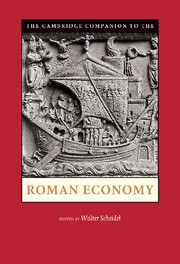Book contents
- Frontmatter
- Contents
- List of Figures
- Note on the Contributors
- Abbreviations
- The Roman world at the time of Marcus Aurelius
- 1 Approaching the Roman economy
- Part I Theory
- Part II Labor
- Part III Production
- 7 Raw materials and energy
- 8 Food production
- 9 Manufacturing
- Part IV Distribution
- Part V Outcomes
- Further reading*
- Bibliography
- Index
9 - Manufacturing
from Part III - Production
Published online by Cambridge University Press: 05 February 2013
- Frontmatter
- Contents
- List of Figures
- Note on the Contributors
- Abbreviations
- The Roman world at the time of Marcus Aurelius
- 1 Approaching the Roman economy
- Part I Theory
- Part II Labor
- Part III Production
- 7 Raw materials and energy
- 8 Food production
- 9 Manufacturing
- Part IV Distribution
- Part V Outcomes
- Further reading*
- Bibliography
- Index
Summary
Our efforts to understand the way in which manufacturing was organized in the Roman world are necessarily hampered by the state of our evidence. Not only is this evidence fragmentary, it is also capable of supporting potentially conflicting conclusions about the dominant patterns of industrial organization and the degree to which these patterns may have changed over time.
On one level, the surviving material is capable of supporting an argument about modest development in the scale and organizational complexity of manufacturing. It is clear, for instance, that urban development and modest economic growth in Italy did create concentrated consumer markets in which demand became sufficient to provoke labor differentiation and specialization within several individual industries. Specialization is best attested in industries geared toward elite consumption, such as construction or the manufacture of durable goods in precious metals (both of which I explore in more detail below). Specialization may also have existed at lower levels of the market: Xenophon notes that in the shoemaking industries in Athens during the fourth century bce, some men earned a living by cutting out soles, others by fashioning the uppers, and more still by stitching the pieces together; there is no reason to doubt that the same held true in the Roman empire (Xen. Cyr. 8.2.5).
- Type
- Chapter
- Information
- The Cambridge Companion to the Roman Economy , pp. 175 - 194Publisher: Cambridge University PressPrint publication year: 2012
- 4
- Cited by



